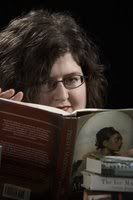 The Seas, Samantha Hunt’s debut novel, relates the coming of age story of a nameless 19-year-old young woman as she struggles to free herself from small town life and a terrifying destiny. Branded by her father’s suicidal walk into the ocean eleven years earlier, and by his insistence that she is a mermaid, the narrator is consumed by her love for the Gulf War Veteran Jude – to the point that it begins to affect her vision. Terrified that her mermaid self will destroy the object of her love, and isolated from a mother who “collects silence inside her”, the narrator spends her time waiting:
The Seas, Samantha Hunt’s debut novel, relates the coming of age story of a nameless 19-year-old young woman as she struggles to free herself from small town life and a terrifying destiny. Branded by her father’s suicidal walk into the ocean eleven years earlier, and by his insistence that she is a mermaid, the narrator is consumed by her love for the Gulf War Veteran Jude – to the point that it begins to affect her vision. Terrified that her mermaid self will destroy the object of her love, and isolated from a mother who “collects silence inside her”, the narrator spends her time waiting:“Waiting to grow up. Waiting for my father to return. Waiting for Jude. Waiting for something big to happen.”
Caught in a place between reality and myth, her delusions lead to actions that ensure she will never escape the ocean’s pull and her increasing separation from reality.
Hunt has created a poignant yet creepy novel, filled with images of water that seem to overwhelm the narrator. Desperate to fulfill her destiny, yet caught by her obsessive love for Jude, this young woman is caught by the dilemma faced by Undine, the Elemental of Water and goddess portrayed by Homer. Her love for Jude threatens her true destiny as a water spirit, only through loving him and giving herself to him can she truly become a woman and gain a soul. Isolated from her mother, the young woman has only her father’s mythology and her own desires to guide her into womanhood.
Capturing the essence of mermaid, or water spirit, legends in The Seas helps Hunt create a truly unique tale that illuminates her personal views on being a young woman in modern times. Hunt describes her choice of topic thus:
“Mermaids, as of late, have been co-opted by Hallmark, Disney, and the like. But mermaids are terrifying…They are gruesome distortions of the female form that speak to the human fear of females, particularly females as sexual beings. I thought using a mermaid as narrator would be helpful in explaining how truly awkward it feels to grow from adolescence into a woman in America.”
Hunt creates a mythology that suggests by remaining cold, a true mermaid, the narrator can gain freedom. She must put her father and Jude behind her, and adopt the attitude of the ocean, which “is full of everything except mercy.” If she doesn’t she is destined to suffer a fate similar to Undine, drowning her love with her kisses.
Words have power in The Seas - literal power. The narrator, falling on type, finds the letters have formed words in her bruises. Words also are the narrator’s only connection to her perceived reality, represented by her grandfather and his fascination with dictionaries. Her mother, used to silence, finds words too precise. The narrator finds water full of words with many possible meanings. It is here that Hunt leaves the reader – a novel that is open to whatever ending each finds within the words.
Samantha Hunt, an artist, writer and teacher at Pratt Institute in Brooklyn, spent four years writing The Seas. As she explains in an interview with Powell Books:
“First I wrote this book as a collection of two-hundred-fifty-word stories. Two hundred of them. Then I put it aside and I had the bad idea to write it as a book of poems, which is around somewhere still. But I put it aside again, and when I went back to it I made it into The Seas. That's why the novel took four years.”
Her next novel - The Invention of Everything Else - on the life of Nikola Tesla and early electrical experiments in America, is to be published by Houghton Mifflin in Spring 2007.
See the review as it is posted at Curled Up with a Good Book - The Seas.


3 comments:
I think using a mermaid as a narrator is a novel one. Thanks so much for the review, Janelle. I will look for this book.
Do you want my copy? I can put it aside with the other books for you.
Wow, yes, that would be wonderful!
Thanks Janelle, you're a sweetie!
Shall we trade like we did last time? Or do you find Kitchener inconvenient? Let me know.
Thanks
Post a Comment